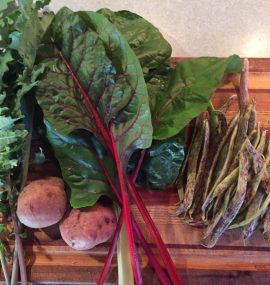A smorgasbord of possibilities
Pick one and make it your own
Abundant scientific and medical research confirms that Eat Better is one of the best ways you can improve your health and well-being. But what does Eat Better mean in practice? The following list gives you practical, evidence-based recommendations from which you can pick one. Once you’ve incorporated that choice in your daily life, you might want to choose another one. And so on. Here goes …
1) Avoid trans fats. Overwhelming scientific evidence documents the adverse health effects of trans fats. The USDA recently restricted the use of trans fats in processed foods. But manufacturers can still include up to 0.5 grams of trans fats per serving without listing it on the label. My advice: Limit your consumption of junk foods, a primary source of trans fats.
2) Limit your intake of added sugar. In practice, this may mean cutting back on sugar-sweetened drinks. If you like yogurt, switch from the sweetened kinds to unsweetened strained, Greek yogurt. My wife and I did, and you can too.
3) Eat more fiber. That means eating more veggies, fruits, pulses (beans, lentils, and their relatives), and whole grains. Be wary of products that tout “made with whole grains”. Read the label to make sure that whole grains top the list of ingredients. Wheat flour is white flour, which you want to minimize.
4) Limit your consumption of refined grains. See 3) above. Culprits include most breads, bagels, donuts, cookies, many tortillas, most snack foods, and cakes.
5) Ramp up the non-starchy veggies and fruits. You’ve heard this a million times. Why not finally do something about it?
6) Learn how to cook veggies so you like to eat them. Then it won’t seem like a chore. I used to avoid eating kale, one of the most nutritious foods. I’m indebted to my friend, Kim, who showed me how to prepare kale that my wife and I love to eat.
7) Eat home-cooked meals more often. The food / restaurant industry has created ultra-palatable foods and dining experiences that encourage over eating. You don’t need a daily dose of restaurant food that’s loaded with sugar, salt, fat, and calories.
8) Skip the salt. Excessive salt promotes high blood pressure, which increases your risk of cardiovascular and other diseases. You can gradually wean yourself of added salt if you won’t give it up all at once.
9) Grow a garden. If you have no experience, start small and simple. Recruit a knowledgeable friend to help you get going. My wife and reveled in our two-month long feast of garden-grown spinach this spring then Swiss chard, beans, and new potatoes.
10) Replace refined vegetable oils with extra virgin olive oil. The latter forms the center piece of the widely regarded Mediterranean diet.
11) Pay attention to what you eat and how it makes you feel. Many of us pay no attention at all to what we eat. We watch TV or read the newspaper or simply shovel in the food. Research suggests that paying attention to your feelings of fullness can help you put down your fork before you’re stuffed. And that can help you avoid mindless overeating.
12) Create a supportive eating environment. You’ll eat less from smaller plates and bowls. Serve yourself and your family members then put away leftover food (except if you have voracious teenagers). Keep containers of tempting foods in the cupboard rather than leaving them out on the counter. Avoid eating in front of the television.
Pick one of the above or dream up one yourself and Eat Better.








